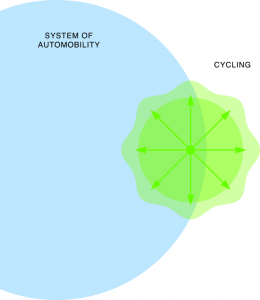The growing practice approach consists in providing targeted support to those who wish to engage in a specific practice. This support is mainly organised by civil society and comes mostly in the form of small-scale activities. The activities are designed to help overcome specific obstacles to engaging in the practice.
In my case study of urban transport cycling in Santiago de Chile, I identified four moments at which engaging in urban transport cycling proved to be problematic:
- acquiring a bicycle;
- adjustments, maintenance and repairs;
- learning to ride a bicycle; and
- cycling in urban traffic.
For each of these potential ‘points of failure’, there were activities organised by pro-cycling organisations, providing targeted support to (potential) cyclists.
In my thesis, I argue that while providing targeted support, the pro-cycling organisations also create and develop the community of practice, i.e. the community of people engaging in urban transport cycling. The activities implemented by pro-cycling organisations did not only provide direct support, but also created spaces to negotiate among the community a shared understanding of urban transport cycling and shared rules of the practice, i.e. what it means to cycle and how it should be done. The members also aimed to create a shared repertoire, i.e. a common language, routines, stories, tools etc. In these spaces of mutual engagement, old and new members received emotional support, which was crucial in the face of the competition through driving.
Finally, during these activities, the members of the community also reached out beyond the community of practice not only to recruit new members, but also to develop a positive image and general understanding of the practice in the urban population and to contribute to stabilising the practice as part of the urban transport system.

Wesslowski, V. (2014) Facilitating a Contested Practice: Building and growing urban transport cycling in Santiago de Chile. PhD thesis. The University of Manchester, p. 242.
The figure above summarises the genesis of growing practice interventions. Contrary to the building practice approach, the interventions do not emerge from the system of automobility, but from the core of the community of practice and expand the practice from within. The area of expansion is represented in green because the activities directly target the participation in the practice and are inherently linked to growing and consolidating the community of practice.
The research also suggests that small-scale support activities might be more significant than is often assumed. Although the effectiveness of the activities of the cycling organisations mentioned above was generally acknowledged, they were seldomly viewed as significant contribution to increasing urban transport cycling. The main reason for this lack of credit was the issue of scale. However, the small scale of the activities had significant advantages vis-à-vis catch-all policy measures, such as the building practice approach. The nuanced understanding within the cycling organisations of the practice as well as its potential points of failure and the small scale of the activities allowed the cycling organisations to address the difficulties of individual carriers in a personalised way.
Furthermore, several beneficiaries of these activities suggested that the enthusiasm within the cycling organisations and the emotional support which the interviewees had received had been important aspects of their experience with the community of practice.
Finally, some interviews pointed to the possibility of a diffusion of the practice through a ‘multiplier effect’, which would further contribute to growing the practice and its community, possibly long after the support from the cycling organisations had ended. In view of the size of the city and the challenge of systemic change, small-scale activities may seem insignificant, but this research suggests that the small-scale personalised nature of these activities can be effective in growing the practice of urban transport cycling in a decentralised organic way.
